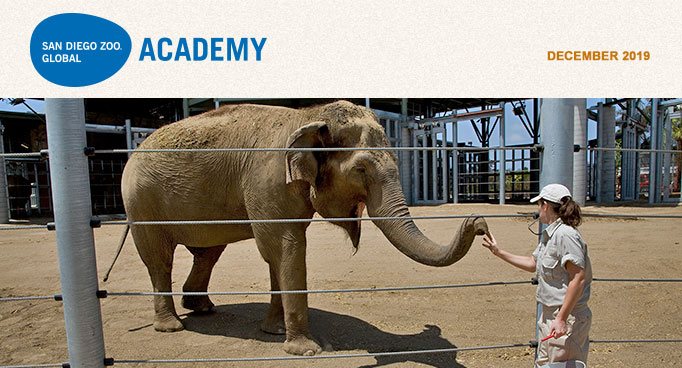 |
The Right Thing, the Right Way—Douglas G. Myers
 By Donald Janssen, DVM By Donald Janssen, DVM
I love to study great leaders. They are a joy to work for. They bring honor, never scandal, to their office and organization. They leave a record of unmatched accomplishments while giving the credit to others. The best of the best lead with deep, personal humility and an uncanny ability to know what is right and to do it the right way. They understand the value of serving others and building trusting relationships. They generate loyalty because of their character. They overcome opposition with patience and persistence. They bring unity where there was division, while valuing diversity of thought. They take risks before others dare. These leaders are an inspiration in the moment, and to future generations. Doug Myers, who recently retired as president/CEO of San Diego Zoo Global, qualifies on all counts.
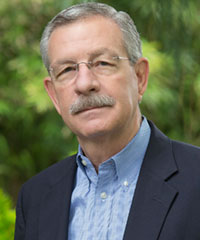
Douglas G. Myers |
By all traditional measures, San Diego Zoo Global has thrived under Doug's guidance. He led the organization by practicing good business principles, and the organization has achieved head-turning financial success and come through many economic downturns even stronger than it had been before. But more to the point, the organization was reborn under his leadership, with an even greater vision of what a zoo can do for conservation and animal life. And he has done all that by caring about people first.
When asked why our organization was embarking on a bold new project or direction, he would often say, "Because it is the right thing to do." That simple statement was always his bottom line, backed by extensive thought and consideration. Those of us he expected to make the "thing" happen heard a slightly different version. We heard, "If it is the right thing to do, we will do it the right way." He has followed that same pattern of knowing and choosing the right thing time after time.
It was Doug who, sickened by the loss of human life among elephant keepers, challenged all zoos to manage elephants with protected contact, starting with his own institution. It was Doug who, by bringing giant pandas to San Diego, proved that a zoo could contribute to saving an endangered species from the brink of extinction. It was Doug who demanded to know that all animals under our care were thriving, and that their welfare could be assessed scientifically. It was Doug who saw that the organization he led had now achieved the capacity to embark on an impossible dream: to stop the seemingly inevitable extinction of the northern white rhinoceros.
Meeting with Doug individually is a unique experience. You become his only focus. He makes it clear he cares more about you than any troubling circumstance. I always walked away from such a meeting with my spirits lifted and motivated to do better, regardless of whether I got what I was hoping for from the meeting. I often joked that I suspected he had aerosolized some substance in his office to make us feel good. But it was really just Doug's ability to listen and show that he cared.
I love to study great leaders. They are rare and precious. Recognizing the right thing, insisting it be done the right way, having a deep commitment to the organization and its mission, caring about people and relationships, and keeping his power under control: this is Doug's legacy.
Doug, you will be missed.
For more information about this article, please contact Dr. Don Janssen at don.janssen@gmail.com.
Leadership insights are contributed by San Diego Zoo Global's retired corporate director of animal health, Dr. Don Janssen, the first of which appeared in the March 2019 issue of the Academy newsletter. Click here for the Academy newsletter archive.
To learn more about how to put behavior-based standards in place, read Upside Down Leadership: A Zoo Veterinarian's Journey to Becoming a Servant Leader. You'll find the book at ShopZoo, Amazon (including a Kindle version), and Barnes & Noble.
Leadership: Changing of the Guard
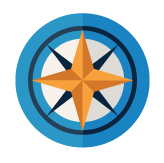 By Gary Priest, Curator of Animal Care Training, San Diego Zoo Global Academy By Gary Priest, Curator of Animal Care Training, San Diego Zoo Global Academy
For over 34 years, San Diego Zoo Global President and CEO Douglas G. Myers has skillfully guided and grown our organization. Earlier this year, Doug announced that he would be retiring at the end of 2019. Those of us who have known and worked with Doug over the years are experiencing mixed emotions. We are happy for Doug and his family, and at the same time, we are saddened to say goodbye.
From the beginning, Doug has taken a special interest in the San Diego Zoo Global Academy. The Academy has been the beneficiary of his knowledge, wisdom, and experience.
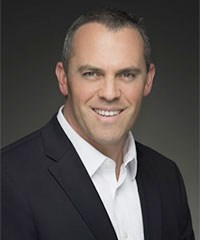
Paul A. Baribault |
Doug has always led with a gentle management style and a light but firm hand on the ship's wheel. Once the course of the journey was charted, Jon and I knew that Doug would always have our backs, especially during the storms that usually arise with any new venture. Doug's early admonition to us regarding the Academy was, "The rising tide lifts all boats." If we could meet our own staff training needs, then we might be able to help our conservation partners' staff training needs as well. What the Academy and San Diego Zoo Global have become is a direct testimonial to Doug's leadership.
Doug has also guided the transition with our new president and CEO, Paul A. Baribault. Last month, Paul sent San Diego Zoo Global employees a video introduction about himself and his previous work at The Walt Disney Studios and Disneynature. He shared his passion for conservation, which is what brought him to San Diego Zoo Global. As he now takes the helm, the transition in leadership is complete—the baton has been passed, and the story continues. We are so very thankful to Doug for his guidance and support, and we give our congratulations and welcome to Paul. Onward!
For more information about this article, please contact Gary Priest, San Diego Zoo Global Academy, at gpriest@sandiegozoo.org.
|
Academy News
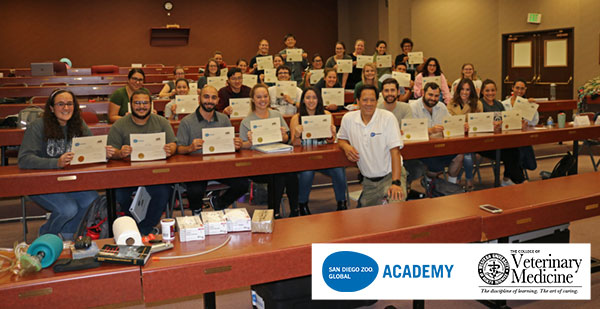
San Diego Zoo Global Academy's Safe Capture Training
San Diego Zoo Global Academy was invited by the Zoo Medicine Society Club at Western University of Health Sciences to present a two-day, on-site Safe Capture training event at the university in Pomona, California last month. A total of 31 students and wildlife professionals joined Safe Capture instructor Curtis Eng, DVM, for instruction in the safe chemical immobilization of animals. Topics included strategies of approach, medication delivery techniques, capture pharmacology, drug dosages and volume calculations, anesthetic monitoring and post-capture care, and medical emergencies associated with chemical immobilization. Please contact us if you would like to discuss a training event at your college, university, or other institution. Contact Us for Safe Capture.
We are filling up a great nationwide schedule of Safe Capture training events for 2020. Please watch the Academy newsletter and Safe Capture web page as we open up registration for more events. The first two on the schedule are:
- California (Irvine): Chemical Immobilization,
City of Irvine Police Department, January 27-28, 2020.
- Georgia (Athens): Chemical Immobilization,
University of Georgia Veterinary Medical Learning Center, February 22-23, 2020.
For more information about this exciting new Academy offering, visit the Safe Capture Website.
 Find Us on LinkedIn! Find Us on LinkedIn!
San Diego Zoo Global Academy is now on LinkedIn. We feature new posts frequently, highlighting Academy courses including the new Safe Capture training. For regular updates, check it out and follow us on LinkedIn. Tell your friends in the animal care profession, and help us build an ever-expanding community of connections in the wildlife world.
For more information about our LinkedIn presence, please contact Becky Lynn at blynn@sandiegozoo.org.
Administrator's Users Group Webinar
 Please join us for the Administrator's Users Group Webinar, hosted by Academy partner CypherWorx. The next webinar is Wednesday, December 18, at 11 a.m. Pacific Standard Time (PST). Please join us for the Administrator's Users Group Webinar, hosted by Academy partner CypherWorx. The next webinar is Wednesday, December 18, at 11 a.m. Pacific Standard Time (PST).
Register for this webinar here.
After registering, you will receive a confirmation email containing information about joining the webinar.
|
Academy Contributors
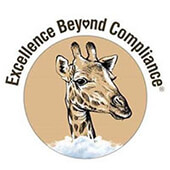 Getting Better All the Time Getting Better All the Time
Making It All About the Animals Makes All the Difference
By James F. Gesualdi
To keep ahead, each one of us, no matter what our task, must search for new and better methods—for even that which we now do well must be done better tomorrow.
—James F. Bell
As long as a zoological—or any animal-related—organization cares for a single animal, the care and well-being of that animal is the organization's most important responsibility. It is certainly the most important thing for those animals. Given that there are many people (like you) involved in caring for animals, and others visit or study them, the well-being of people may very well be an equally important responsibility. We have a multitude of important obligations—public safety, education, conservation, research in animal welfare, wildlife conservation, being environmentally conscious, and serving as welcoming and inclusive community centers. Yet, it starts and ends with our commitment to the well-being and quality of life of the animals in our care.
Let's examine the significance of making it all about the animals, in the context of some recent developments impacting the marine mammal and zoological communities. In recent months, and during the last several years, there has been a growing number of companies and other organizations developing and implementing corporate animal welfare policies and practices to guide their business actions and interactions. This demonstrates that the still-forming public consciousness about animal welfare has been elevated to the point that it is seen as a key factor in individual and corporate decision-making.
This is generally a good thing, and the zoological community has contributed to raising consciousness about animal welfare. When the policies and practices directly help animals, this is an even better thing. In such cases, these corporate guides could be said to be all about the animals.
Within the tourism and travel field, some of these recent efforts should be of great interest to the zoological community, especially those that essentially "boycott" certain animal-related activities or organizations that do not meet specified standards, or that involve activities that are deemed to be "exploitive." On many things, there may be widespread agreement; on some, like certain interactions or particular animal species, there may be respectful disagreement. Compounding some of the challenges here may be the influence of some zoological critics in driving elements of these policies. On the other hand, this also presents opportunities for engagement, growth, and transformation.
To blame our critics, or to maintain that we are better and different from what some of these policies purport to address, just extends the areas of conflict and difficulty. It also perpetuates the mistake of not making it all about the animals. One potential missed opportunity in these policies and practices occurs where they opt out of using their influence to leverage meaningful, ongoing improvements in animals' lives. Such further improvement is possible with credible, responsible organizations like accredited zoos and aquariums, which will continue to exist with overwhelming public support.
Within the zoological community, there should be a task force charged with reviewing and analyzing these new corporate animal welfare policies and practices, and reporting back on the following:
- What are the general principles underlying these corporate animal welfare policies and practices?
- What are our own animal welfare policies and practices?
- Where is the common ground within these corporate animal welfare policies, ours, and our own guiding principles and accreditation standards?
- What are the specific action items and elements of agreement?
- What are the elements of respectful disagreement, reasons why, and specific action items? On these points, what perspectives best serve the animals' interests, needs, and well-being—and how?
- What do these corporate animal welfare policies and practices tell us about what and how we can improve?
- Are there any ways in which we could help improve these corporate animal welfare policies and practices? For instance, some recognize the Five Freedoms, but why not the more advanced Five Opportunities to Thrive developed by Vicino and Miller within the zoological field? This shows and shares our expertise in a constructive manner.
In discussing this subject of corporate animal welfare policies and practices with colleagues recently, it was suggested that people dealing with these agencies or companies that are no longer partnering with zoological organizations should be invited to visit and explore, and assess these experiences for themselves.
There is much good that should come from corporate animal welfare policies and practices, including our own. Where we may respectfully disagree with corporate animal welfare policies and practices impacting the zoological community, let's do our homework. Learn from what has happened and make it better—and all about the animals. I know from experience that this can work, having thoroughly reviewed, commented upon, and contributed to the final text of one of the first comprehensive tourism and travel-related animal facility operation and welfare assessments. That was over a decade ago, and it taught me much about today's efforts. Most importantly, we must strive to continually show the public how much we care for animals and their well-being. That is the way to earn and uphold the public trust.
We have the animals in our care, the expertise, and the heart to make it all about the animals—not us or "them," but the animals. They are the very beings that inspire us to do our best and continuously improve, as we do good for the animals and our planet.
***
All the very best to you for a happy holiday season and a wonderful 2020, filled with continuous improvement!
©2019 James F. Gesualdi, P.C. The opinions expressed herein are solely those of the author. This is not, nor should it be construed as, legal advice.
For more information on EXCELLENCE BEYOND COMPLIANCEŽ visit http://excellencebeyondcompliance.com/. |

|